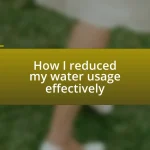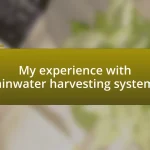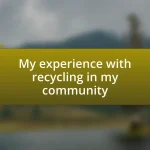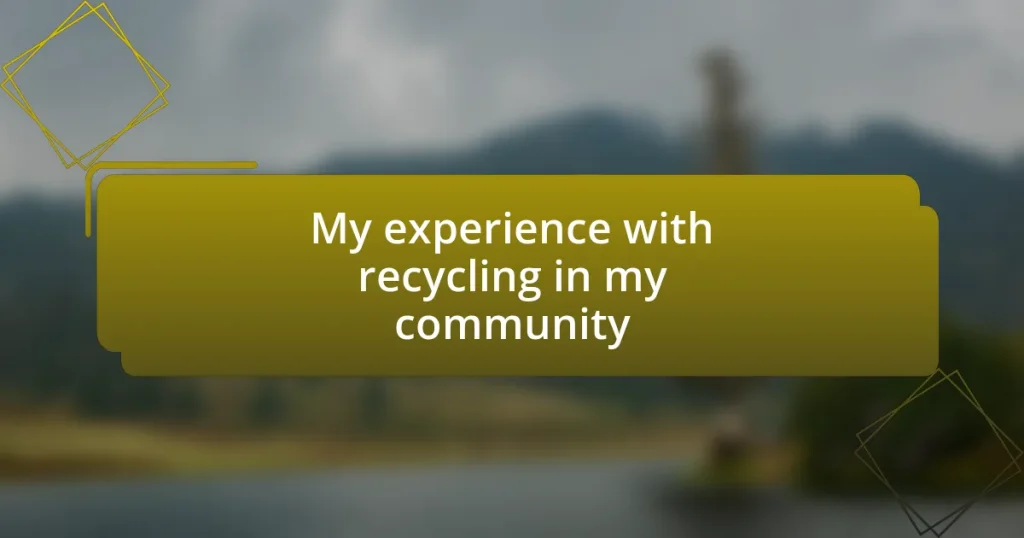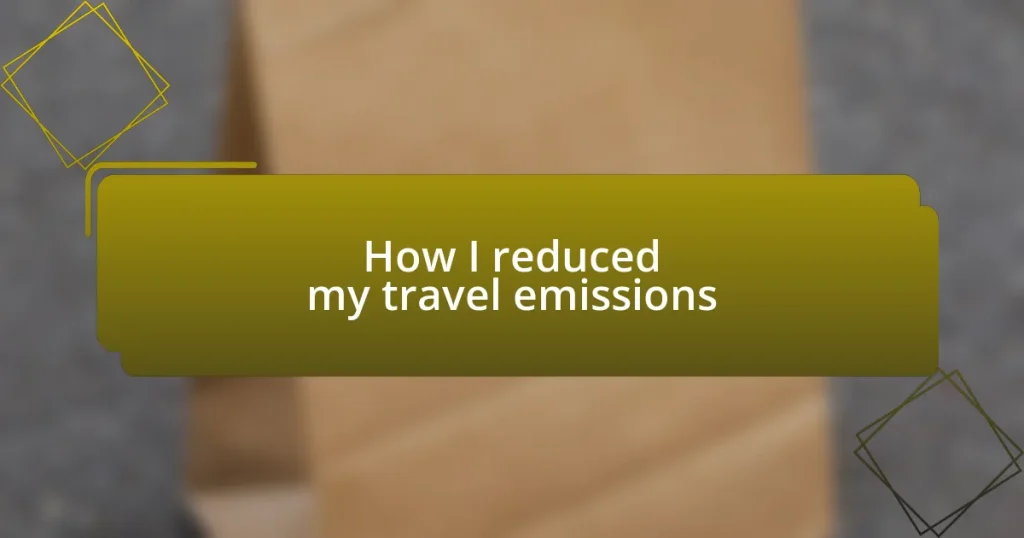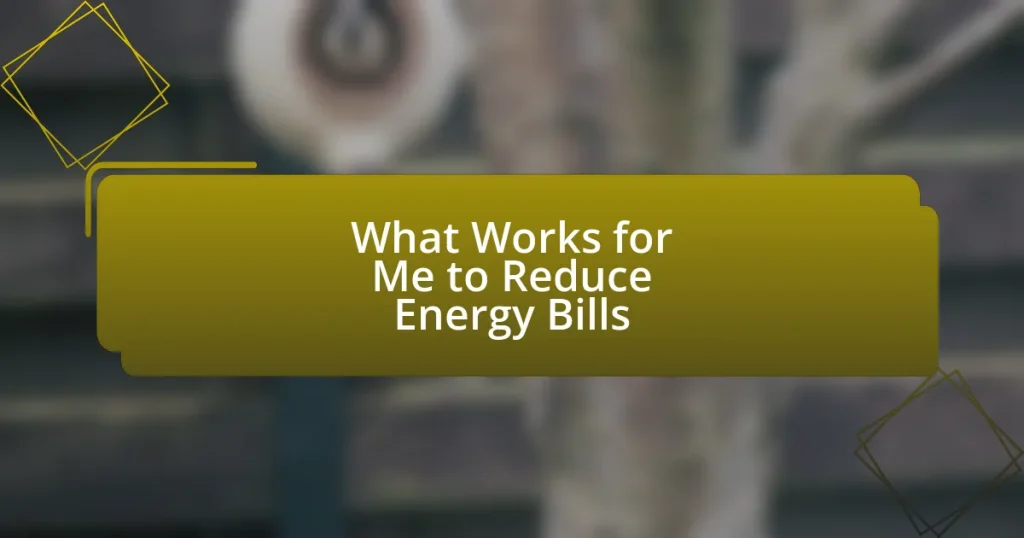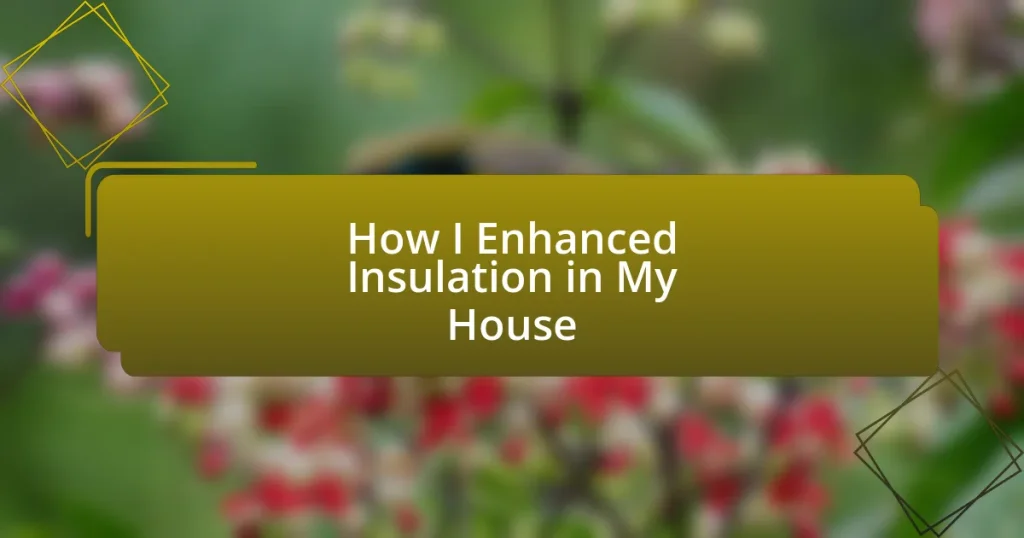Key takeaways:
- Community participation in recycling has increased through local programs and education, fostering a sense of responsibility and pride among residents.
- The introduction of clear, designated recycling bins and monthly clean-up days has enhanced awareness and engaged the community in sustainable practices.
- Challenges such as confusion over recyclable materials and lack of participation highlight the need for continuous education and improved access to recycling resources.
- Recycling significantly impacts the environment by reducing landfill waste, conserving natural resources, and lowering greenhouse gas emissions.
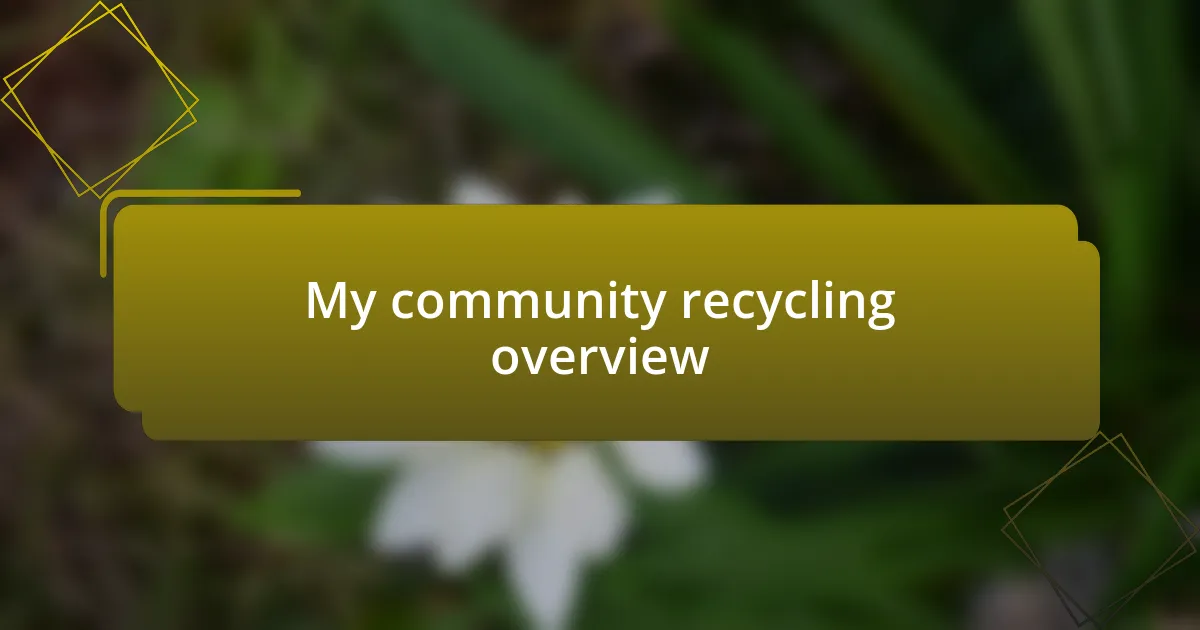
My community recycling overview
Recycling in my community has always felt like a collective effort, where everyone plays a role. I remember the first time I participated in a neighborhood cleanup; it struck me how much litter we found and how rewarding it felt to transform our local park. Have you ever experienced that sense of pride when you see your surroundings improve because of group action?
The recycling program here is pretty straightforward, but it wasn’t always this way. Initially, I struggled to remember what could be recycled, often second-guessing myself. Over time, with local workshops and signs near recycling bins, I gradually gained confidence. Doesn’t it feel empowering when you finally grasp the ins and outs of something that initially seemed daunting?
Additionally, I’ve noticed a shift in attitudes towards recycling among my neighbors. Just the other day, I saw a child excitedly announcing to their parent which items belonged in the recycling versus the trash. It’s moments like these that remind me that fostering awareness starts young, and I can’t help but wonder, how can we encourage even more kids to take part in sustainable practices?
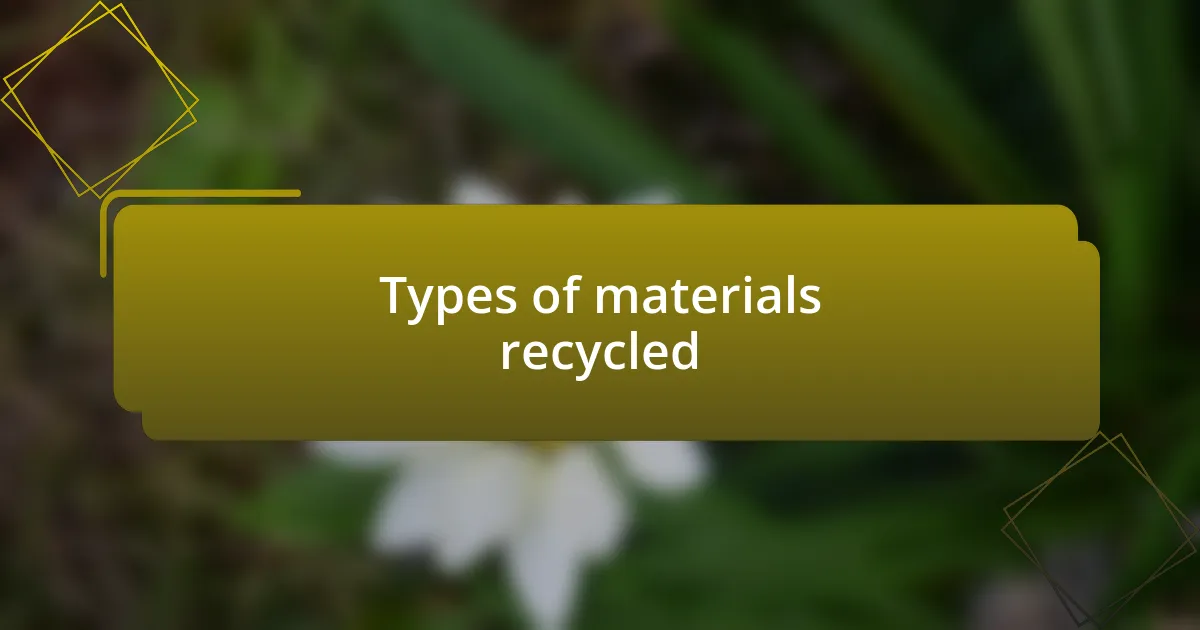
Types of materials recycled
When it comes to recycling, a variety of materials can be processed, each playing an important role in sustainability. I remember the first time I rolled up my sleeves to sort through a pile of recyclables. It was fascinating to see so many different types, from glass bottles to cardboard boxes. Each material has its unique journey for reuse, and understanding these differences has made me appreciate the process even more.
I’ve found that the most common materials recycled in my community include plastics, metals, paper, and glass. Each of these categories has its specific requirements and protocols. For instance, I often struggle with knowing whether a plastic container is recyclable or not, given the various types. It’s prompted me to become more vigilant while shopping and disposing of waste. Have you experienced a similar learning curve?
Through local initiatives, my community has established a well-defined classification for recyclable materials. Attending workshops made me realize how critical proper sorting is; it not only enhances the recycling process but also reduces contamination. There’s something satisfying about knowing I’m contributing to a larger cycle of environmental responsibility by simply understanding what can be recycled.
| Type of Material | Examples |
|---|---|
| Plastics | Bottles, containers, bags |
| Metals | Cans, aluminum foil |
| Paper | Newspapers, cardboard |
| Glass | Bottles, jars |
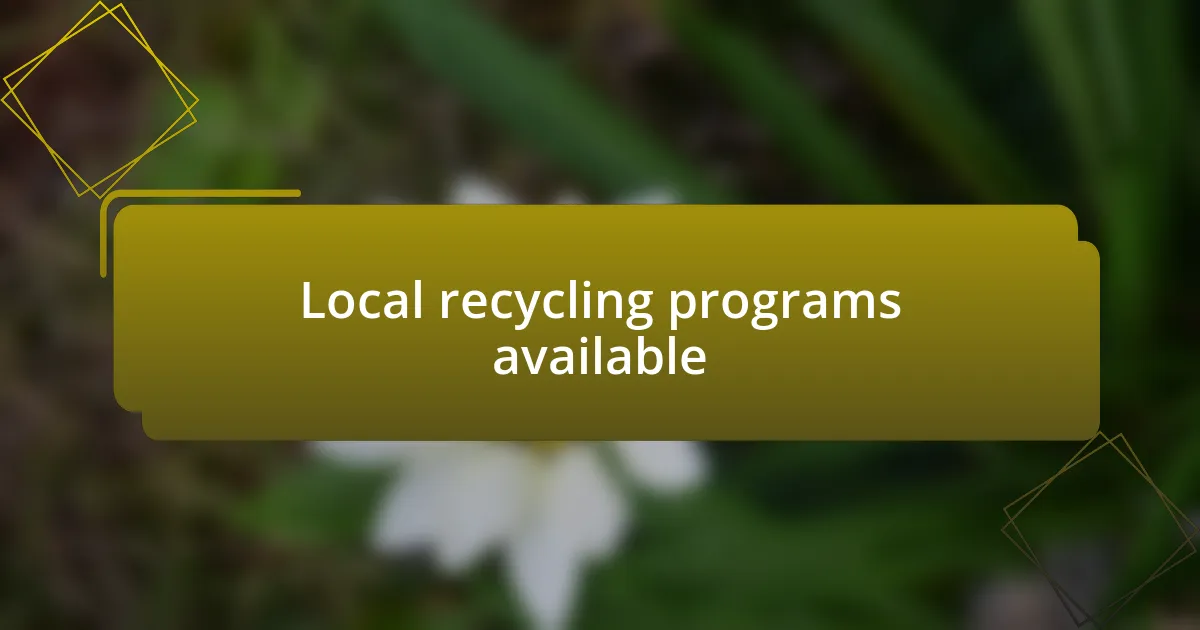
Local recycling programs available
Local recycling programs in my area are quite robust, and they cater to a wide range of materials. I remember the first time I participated in a community clean-up day; it was not just about picking up litter, but also about learning where and how to properly dispose of recyclable materials. Those moments sparked a deeper commitment to contribute actively to our local environment, knowing that every can or bottle counted.
Here are some key local recycling initiatives available in my community:
- Single-stream recycling: This allows residents to place all recyclable materials into one bin, making it easier to participate without needing to sort.
- Electronics recycling days: These events typically occur quarterly, offering a safe way to dispose of outdated gadgets.
- Drop-off centers: Convenient locations across the region accept a specific range of materials, from batteries to textiles.
- Household hazardous waste collection: Scheduled pickups for items like paint and chemicals help ensure these materials are disposed of safely.
- Community workshops: Educational sessions focus on recycling correctly, providing valuable insights into contamination issues and proper sorting techniques.
Reflecting on these programs, I often feel a sense of pride in my community for embracing such initiatives, reinforcing the notion that collective responsibility leads to meaningful change.
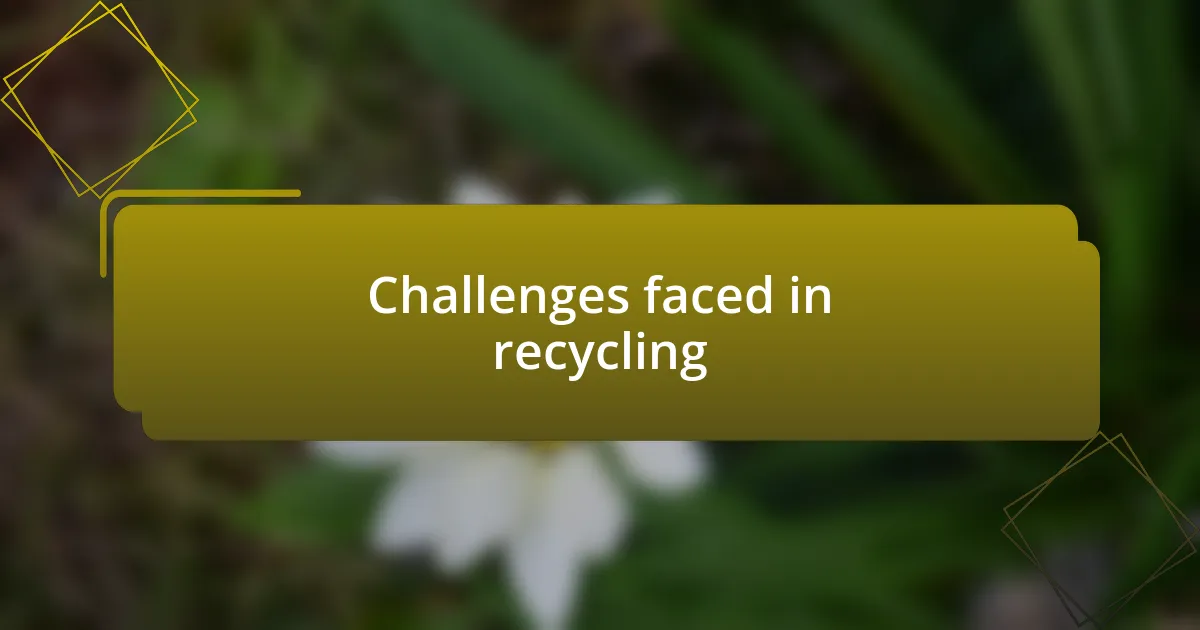
Challenges faced in recycling
One of the biggest challenges I’ve encountered in recycling is the confusion surrounding what can actually be recycled. On several occasions, I found myself debating whether a greasy pizza box could go in the bin. This ambiguity not only caused frustration for me but likely deters others from even trying to recycle, fearing they might inadvertently contaminate the whole batch.
Another significant obstacle is the lack of participation from community members. I’ve seen firsthand how some neighbors overlook recycling days or toss everything indiscriminately into trash bins. I often wonder: what prevents them from getting involved? It feels disheartening because I know that even small efforts can lead to considerable environmental impact.
Moreover, I’ve noticed a lack of incentives for proper recycling practices. During a community meeting, many expressed that while they care about the environment, they don’t see tangible benefits or recognition for their efforts. This makes me question how we can effectively encourage our neighbors to take that extra step. It’s crucial that we address these challenges to foster a more engaged and informed community around recycling.
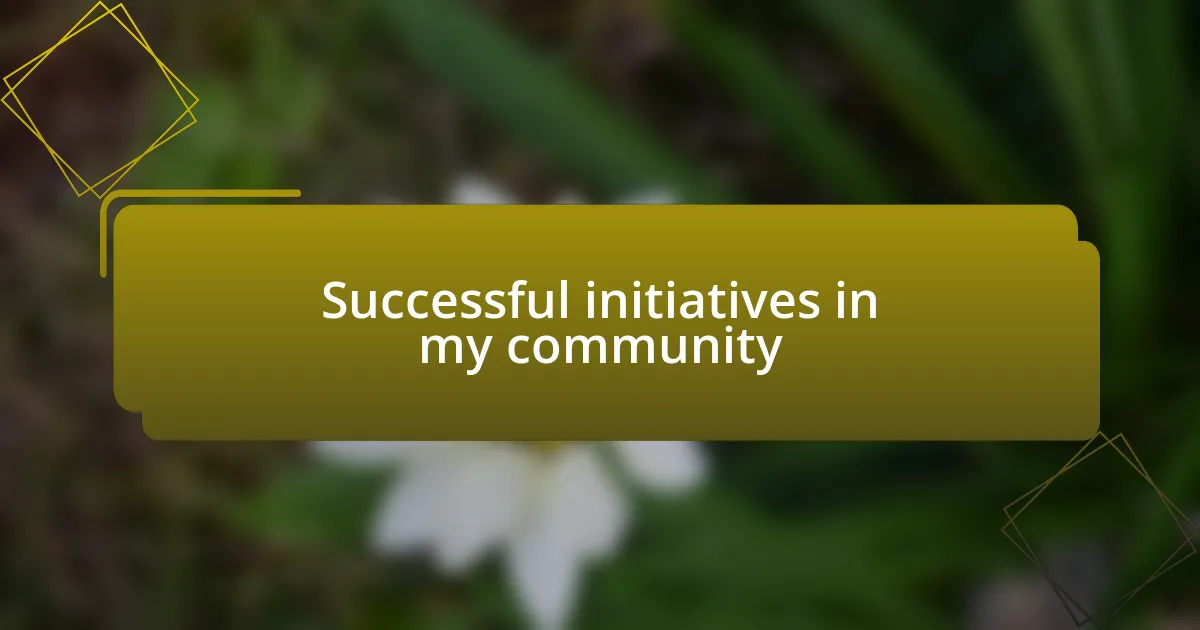
Successful initiatives in my community
One successful initiative in my community has been the introduction of monthly clean-up days, where volunteers gather to tidy up local parks and public spaces. I remember my first time participating; it felt great to work alongside neighbors, all of us united by a common purpose. But beyond the physical cleaning, it sparked conversations about recycling and waste management that lingered long after.
Another remarkable program is the installation of designated recycling bins, clearly labeled for different materials. I once stood by one of these bins, watching as a friend hesitated over what to toss in. It was inspiring to see the bins serve not just as receptacles but as prompts for discussions about recycling right there on-the-spot. This initiative has noticeably increased awareness and usage, changing the way we approach waste disposal.
Additionally, our local schools have embraced sustainability by incorporating recycling education into their curriculums. I attended a presentation by students showcasing their recycling projects, and the pride on their faces was palpable. Isn’t it incredible how educating the younger generation can potentially create long-lasting habits? Their enthusiasm has sparked many parents to reconsider their own recycling practices, creating a ripple effect throughout the community.
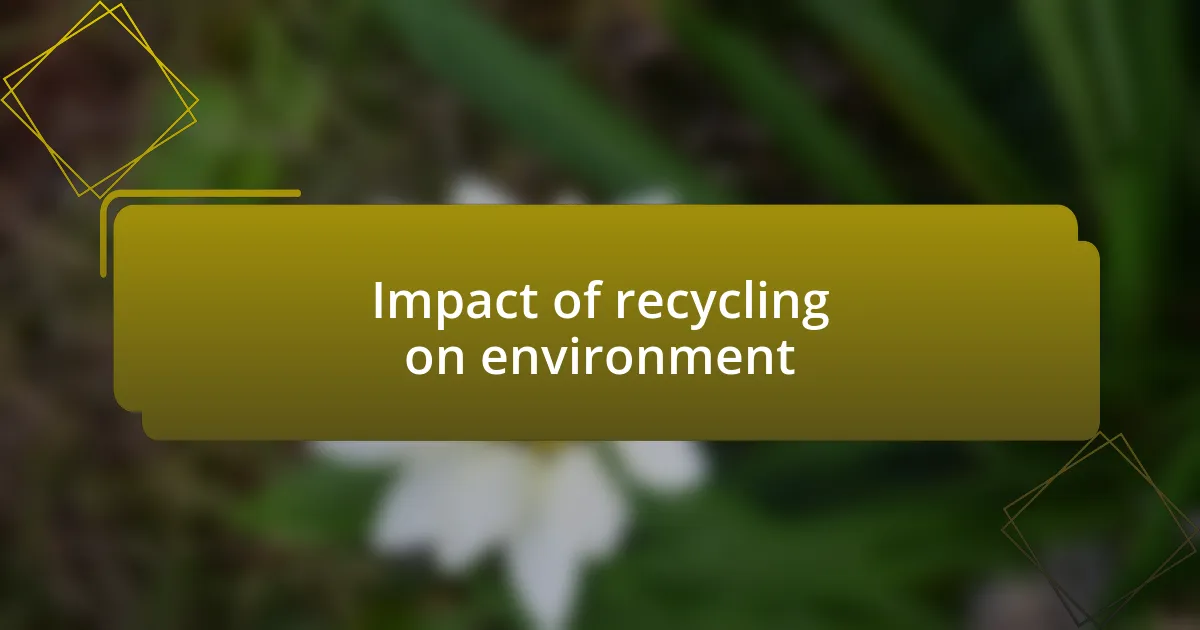
Impact of recycling on environment
Recycling has a profound impact on our environment, as it significantly reduces the amount of waste sent to landfills. I distinctly remember visiting one of our local landfills; the sheer volume of discarded materials was overwhelming. Realizing that many of those items could have been recycled left me pondering how small changes in behavior could lead to drastic reductions in waste.
Moreover, recycling conserves natural resources. For instance, I once learned that recycling one ton of paper saves more than 17 trees, which really struck a chord with me. Imagine how many trees we could save as a community if we all actively participated in recycling! It’s the kind of statistic that makes you sit back and think about the tangible effects of our actions on the planet.
The environmental benefits extend beyond just conserving resources; recycling also reduces greenhouse gas emissions. As I started to incorporate recycling into my daily routine, I felt empowered knowing I was contributing to a larger cause. Isn’t it remarkable how choosing to recycle a simple item, like a plastic bottle, can help mitigate climate change? It’s a reminder that every action counts, and we all play a role in creating a healthier planet for future generations.
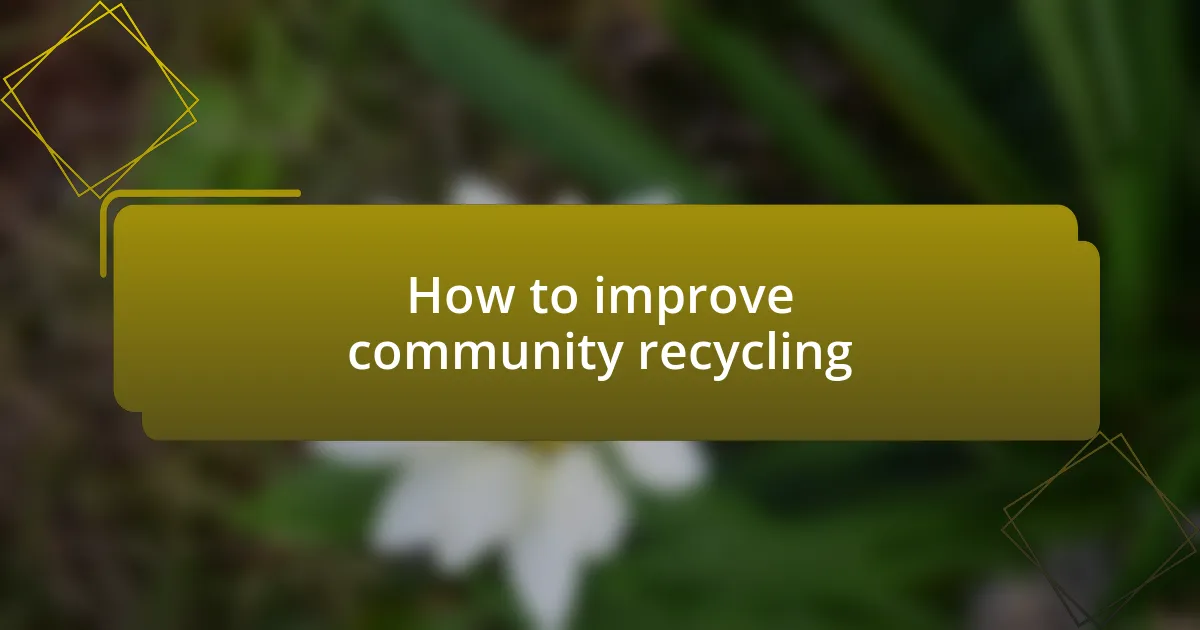
How to improve community recycling
One effective way to improve community recycling is through education and awareness campaigns. I recall a local event where volunteers set up booths to discuss recycling practices. It was eye-opening to see how a simple conversation about what materials are recyclable changed people’s habits right there on the spot. Have you ever witnessed someone’s perspective shift simply through information? It feels incredibly rewarding to be part of that change.
Another approach is to enhance the availability of recycling bins throughout the community. I remember a time when a friend and I took a walk and noticed several public spaces lacking proper recycling options. We decided to reach out to local authorities and advocate for more bins. It’s fascinating how a small initiative like that can make a significant difference. Could you imagine how much more plastic could be diverted from landfills if everyone had easy access to recycling?
Finally, establishing community competitions or challenges can spur enthusiasm for recycling. When our neighborhood held a contest to see which block could recycle the most, it created an exciting atmosphere. People began taking pride in their contributions, and soon everyone was discussing strategies for recycling more effectively. Isn’t it wonderful how a little friendly competition can foster a spirit of collaboration and community?






